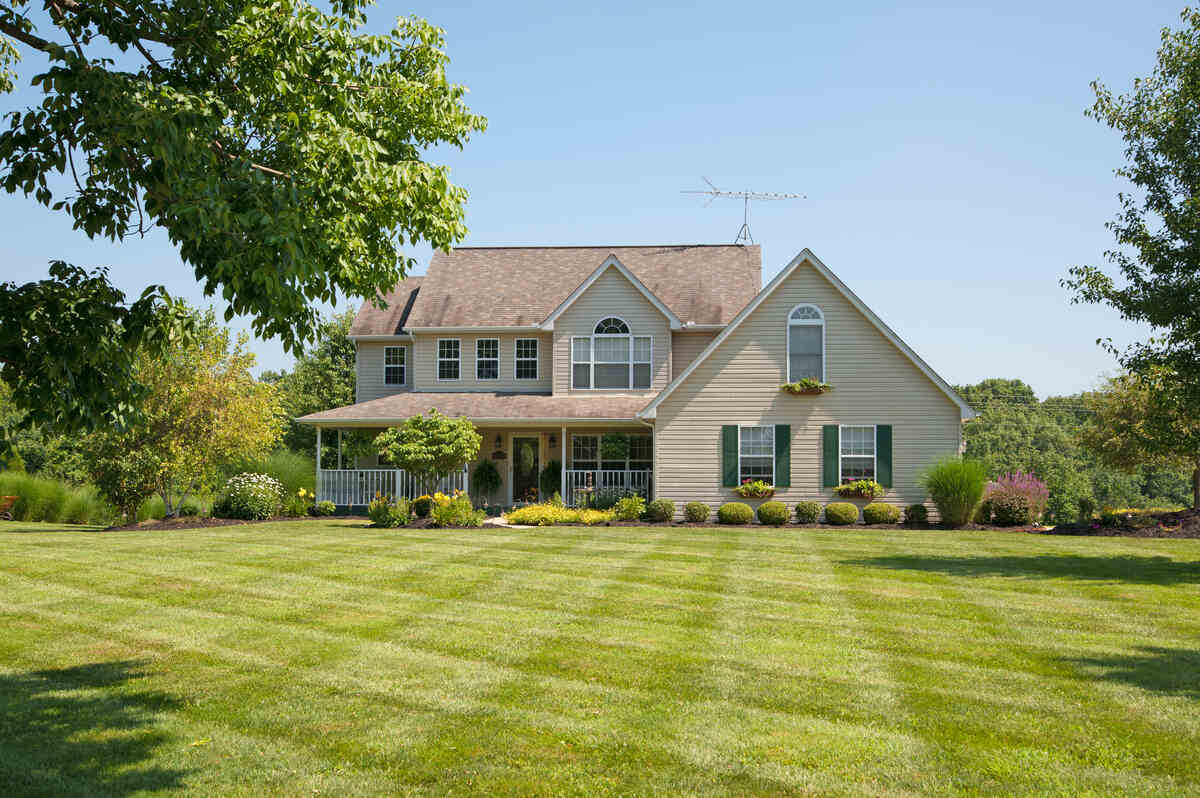
The best grass types that can endure Kentucky’s mild winters and warm summers are Kentucky bluegrass, fine and tall fescue, perennial ryegrass, Bermudagrass, Zoysiagrass, and centipedegrass.
Let’s discuss which one would fit your lawn’s soil and shade conditions.
Best Grass Seed by Region
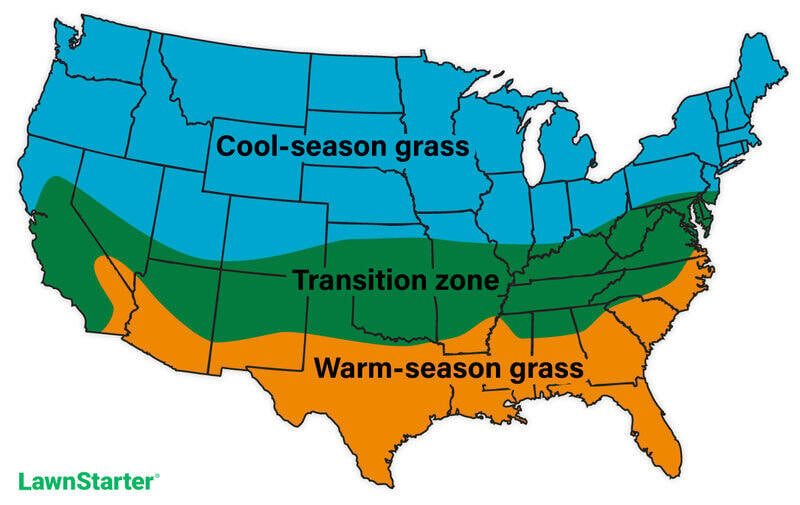
If you’re looking for the best grass to grow in a particular region of Kentucky, here are more specific grass type guides depending on where you live:
- Best Grass Seed for Northern Kentucky: For homeowners from Owen County northward.
- Best Grass Seed for Central Kentucky: For homeowners between Owen and Lincoln counties.
- Best Grass Seed for Eastern Kentucky: For homeowners from Green to Pike counties.
- Best Grass Seed for Western Kentucky: For homeowners from LaRue to Fulton counties.
Cool-Season Grasses
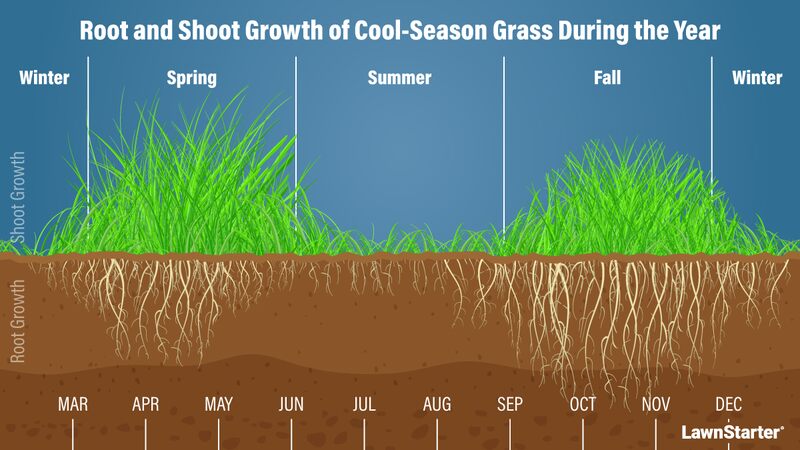
Kentucky’s milder temperatures and moderate rainfall make cool-season grasses a popular choice for lawns. These grasses can survive the temperature and moisture fluctuations in Kentucky. Cool-season grass lawns can be lush and green year-round with proper care and maintenance. The best cool-season grasses for Kentucky are:
Kentucky Bluegrass: Best Grass for Cold Weather
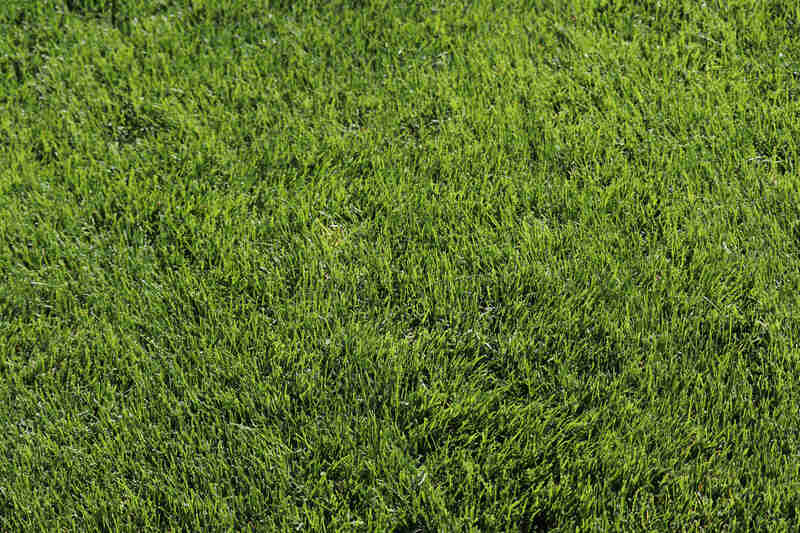
Photo Credit: Shutterstock
Kentucky bluegrass is a resilient grass that thrives in the state’s cooler and more humid regions. However, with proper care and watering, it can grow everywhere in the state. Kentucky bluegrass creates a dense, weed-resistant turf with a fine texture and dark green color that makes it desirable for home and commercial lawns.
Kentucky bluegrass has higher maintenance needs than most grass types. Learn more about how to care for this grass by visiting our Guide to Growing Kentucky Bluegrass.
Grass Seed Options:
– Jonathan Green (11970) Blue Panther Kentucky Bluegrass Grass Seed (3 lbs.)
– SeedRanch Midnight Kentucky Bluegrass Seed (5 lbs.)
Fine Fescue: Best Grass for Shade
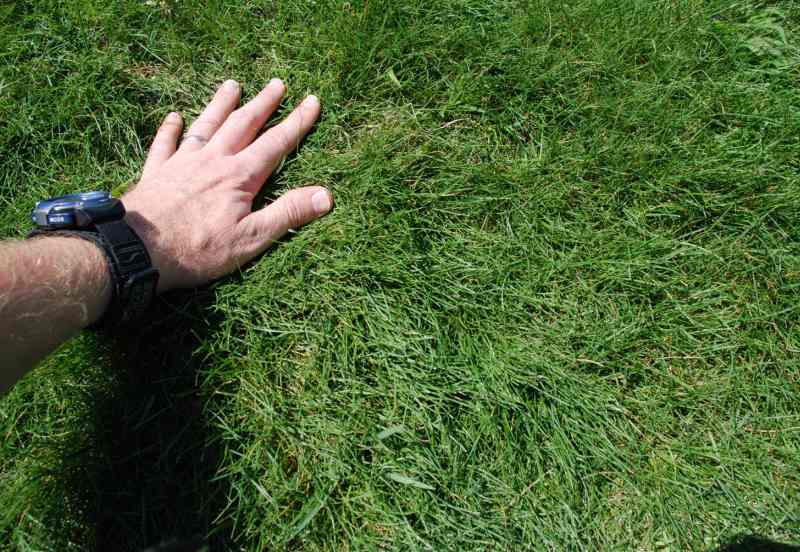
Photo Credit: Aaron J. Patton, Ph.D. / Turfgrass Extension Specialist at Purdue University
Fine fescue is a low-maintenance grass that can be used in lawns where other grasses struggle, such as shady or poorly drained areas. Fine fescue is more drought-resistant than other cool-season grasses due to its extensive root structure.
Fine fescue has moderate maintenance requirements, such as regular watering during dry spells. You can learn more about fine fescue’s needs by reading our Guide to Growing Fine Fescues.
Grass Seed Options:
– Outsidepride Legacy Fine Fescue Grass Seed (5 lbs.)
– Eretz Creeping Red Fine Fescue Seed (choose your size)
– Outsidepride Creeping Red Fine Fescue Grass Seed (25 lbs.)
– Outsidepride Hard Fine Fescue Grass Seed (10 lbs.)
Perennial Ryegrass: Best Grass for Fast Establishment
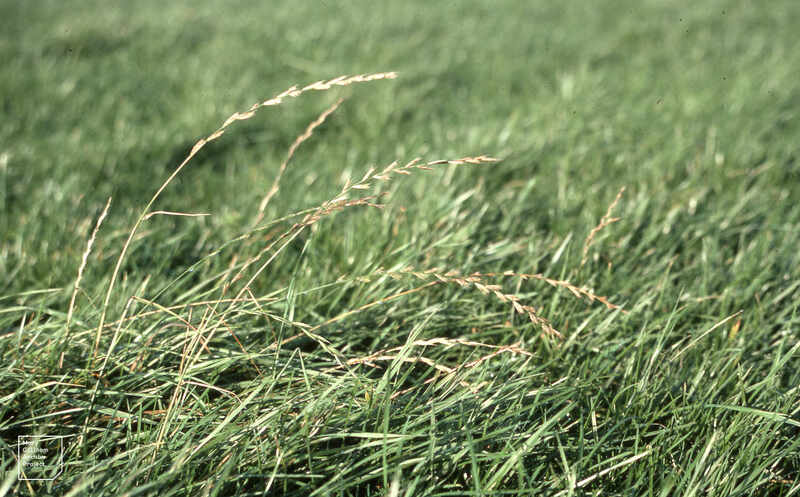
Photo Credit: Dr Mary Gillham Archive Project / Flickr / CC BY 2.0
Although perennial ryegrass can be grown in many areas of Kentucky, it thrives in cooler conditions with moderate rainfall. This grass type is especially well-suited for use in the state’s northern and central regions, where colder temperatures and moderate rainfall are typical.
Perennial ryegrass is widely mixed with other cool-season grasses in Kentucky, such as Kentucky bluegrass and fine fescue. Because of its rapid germination and establishment, perennial ryegrass is a popular choice for overseeding existing lawns or swiftly establishing new lawns.
Perennial ryegrass is distinguished by its fine texture and vivid green color, as well as its dense growth habit. It is also extremely durable and resistant to wear and traffic, making it a popular choice for athletic fields and other high-traffic locations. If you’d like to read more about how to care for this cool-season grass, read our Guide to Growing Perennial Ryegrass.
Grass Seed Options:
– Outsidepride Perennial Ryegrass Seed (5 lbs.)
– Eretz ProTurf Perennial Ryegrass Fine Lawn Seed (choose your size)
Tall Fescue: Best Grass for Poor Soil
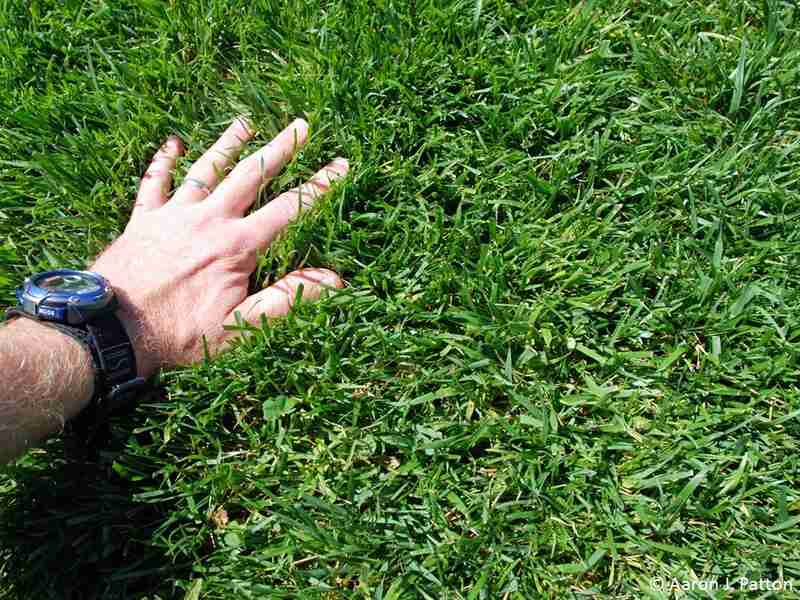
Photo Credit: Aaron J. Patton, Ph.D. / Turfgrass Extension Specialist at Purdue University
Tall fescue is a cool-season grass that thrives in a variety of Kentucky locations, including both urban and rural areas. Tall fescue is well-known for its heat tolerance and drought resistance, making it a popular choice for lawns in regions with hot summers and periods of drought.
Tall fescue can form a long-lasting and attractive lawn if properly cared for and maintained. To learn more about how to care for this grass, read our Tall Fescue Lawn Maintenance Guide for more information on tall fescue.
Grass Seed Options:
– Triple-Play Tall Fescue Grass Seed Blend (5000 sq ft)
– Eretz Kentucky 31 K31 Tall Fescue Grass Seed (choose your size)
– Pennington The Rebels Tall Fescue Grass Seed Mix (7 lb.)
Warm-Season Grasses
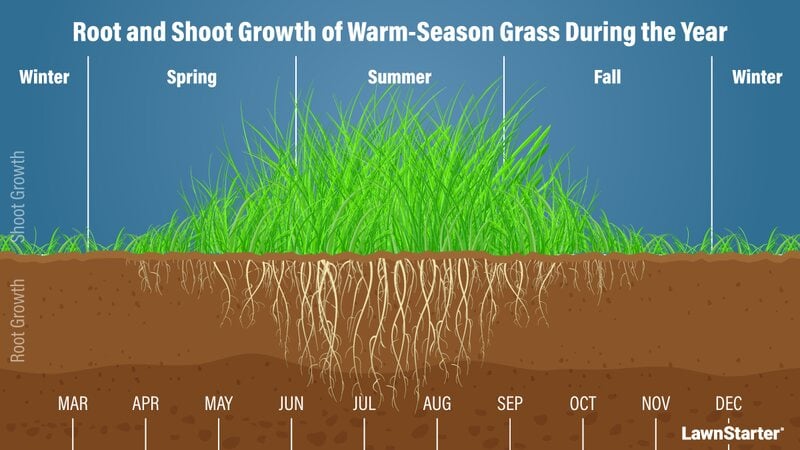
If you live in or plan to landscape a property in Kentucky and seek grasses that thrive in hot and humid conditions, consider planting warm-season grasses. In Kentucky, warm-season grasses tend to become dormant when the weather cools down, so they will not stay green year-round.
However, they can be a wonderful option for homeowners and landscapers wishing to expand their grass options, as they can give a lush and attractive turf throughout the warmer months. The best warm-season grasses for Kentucky include:
Bermudagrass: Best Grass for Heavy Foot Traffic
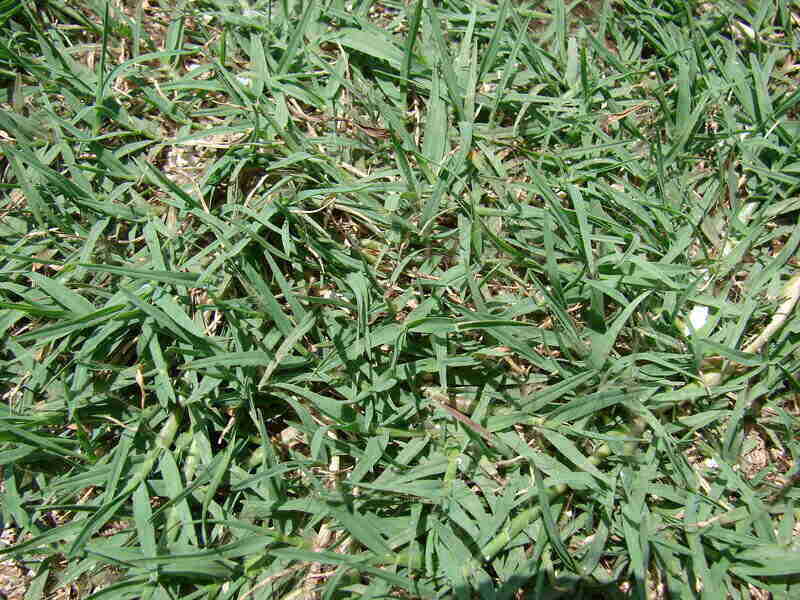
Bermudagrass could be the ideal grass for you if you live in hotter parts of Kentucky. Because of its heat tolerance, hot and muggy summers are perfect for Bermudagrass to grow. However, Bermudagrass can be vulnerable to weed growth, so it’s essential to maintain weed control year-round. Bermuda can survive in any soil type and establishes a good turfgrass.
Although Bermudagrass can make a durable lawn, it does need some extra maintenance to stay at its best. Visit our Bermudagrass Guide: Types, Traits, and Care to learn how to keep it thriving.
Grass Seed Options:
– Scotts Turf Builder Bermudagrass (10-lb. bag)
– Hancock Seed Co. Bermudagrass (50-lb. bag)
Zoysiagrass: Best Low-Maintenance Grass
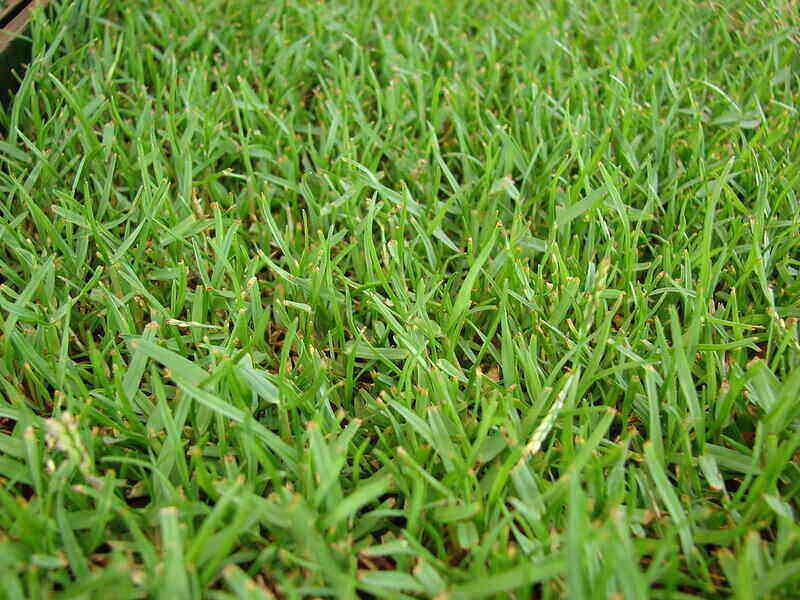
Zoysiagrass is an excellent choice for homeowners and landscapers seeking a low-maintenance warm-season grass. It is commonly used for golf courses, sports fields, and residential lawns since it thrives in direct sunlight.
Well-drained soils are ideal for Zoysiagrass to grow. And with the right maintenance, it will turn into a beautiful, dense, weed-resistant lawn that thrives in the local environment. Visit our guide Growing Zoysiagrass: Everything You Need to Know to learn more about this warm-season grass.
Grass Plug and Seed Options:
– Zoysia Plugs (50 Large Grass Plugs)
– Zoysia Plugs (50 Full & Lush Grass Plugs)
– Zoysia Plugs (100 Plugs)
– Zenith Zoysia Grass Seeds (1/8 lb. of seeds)
How to Choose the Best Grass Seed for Your Kentucky Lawn
You can select the best grass type for your Kentucky lawn by keeping the following considerations in mind:
Shade Tolerance
Is your yard exposed to the sun all day? Or do the trees in your neighborhood project shade onto your property? These are important questions to consider because each grass species has a different shade tolerance. Here’s how the grasses listed in this article can handle shade:
- Low shade tolerance: Bermudagrass, Kentucky bluegrass, perennial ryegrass
- Moderate shade tolerance: Centipedegrass, Zoysiagrass, tall fescue
- High shade tolerance: Fine fescue
Climate
Before selecting the right grass seed for your lawn, think about the climate first. As you know, summers in Kentucky are pretty hot and humid, while winters are generally mild. But temperatures and overall climate can vary according to your location.
Warm-season grasses like Bermudagrass, Zoysiagrass, and centipedegrass prefer warmer temperatures and grow during spring and summer, going dormant when temperatures drop in the fall.
Cool-season grasses like Kentucky bluegrass, tall and fine fescue, and perennial ryegrass thrive in the cooler northern parts of Kentucky. Cool-season grasses grow best in spring and fall and go dormant in summer and winter.
Foot Traffic
If you have children or pets running around on the lawn, you should choose a grass that can withstand high foot traffic. Here’s a quick overview of the foot traffic tolerance of Kentucky’s most popular grass types:
- High foot traffic tolerance: Perennial ryegrass, Bermudagrass, Zoysiagrass
- Moderate foot traffic tolerance: Turf-type tall fescue, Kentucky bluegrass
- Low foot traffic tolerance: Centipedegrass, Fine fescue
Soil Examination
The most important thing when selecting the ideal grass for your lawn in Kentucky is to consider the soil type and pH. Grasses only survive in compatible soils.
- Kentucky bluegrass: Prefers fertile and well-drained soils, with a pH of 6-7.
- Fine fescue: Likes well-drained soils, growing even in sandy, infertile soils. Prefers a soil pH of 5.6 to 6.5.
- Perennial ryegrass: Likes highly fertile and well-drained soils. The soil pH must be between 6 and 7.
- Tall fescue: Grows in clay soils high in organic matter, with an ideal pH of 5.5 to 7.5.
- Bermudagrass: The preferred pH for this grass is 6 to 6.5. It prefers clay soils but can grow in sandy soils as well, as long as it is well-drained and moist.
- Zoysiagrass: Zoysia is tolerant of a variety of soil types, as long as they have good drainage. The recommended soil pH is 6 to 6.5.
- Centipedegrass: Is more tolerant of low-fertility and acidic soil than other grass types. Prefers an acidic pH of 5 or 6.
Depending on your soil type, you may need to seek the advice of a professional lawn care service in Kentucky to grow a luscious lawn. You can also get your soil tested at the University Extension office nearest to you for a proper analysis of the lawn’s soil.
Upkeep or Maintenance
Your lawn is the result of how much effort you put into it. If you want to have a healthy lawn in Kentucky, then you should work on upkeep regularly. If you’re not the type to put lots of effort into your lawn, consider a grass type that will thrive with less maintenance.
Here are the maintenance requirements for our top grass seed picks for Kentucky:
- High-maintenance grasses: Bermudagrass, Kentucky bluegrass
- Moderate-maintenance grasses: Turf-type tall fescue, perennial ryegrass, Zoysiagrass
- Low-maintenance grasses: Centipedegrass, fine fescue
FAQ About the Best Grass for Kentucky
What is Kentucky’s USDA Hardiness Zone?
According to the USDA’s latest hardiness zone map, Kentucky comprises zones 6b to 7b. The best grass seeds for northern Kentucky, which comprises zone 6b, are cool-season grasses, such as Kentucky bluegrass, tall and fine fescues, and perennial ryegrass. The best grasses for zone 7 are Bermudagrass, centipedegrass, and Zoysiagrass.
If you’re unsure about which zone you fall in, visit the USDA interactive map, where you can enter your zip code and find your hardiness zone.
What is the Best Time to Plant Grass Seed in Kentucky?
The best time to plant cool-season grass seed in Kentucky is mid-August to late September and from mid-February to mid-March. A good rule of thumb is to wait for forsythia shrubs to bloom. For warm-season grasses, the best time to plant seeds in Kentucky is from late May to June, when nighttime temperatures consistently surpass 60 F.
How do I Care For my Grass Once I Plant it?
Besides regular mowing, irrigation, fertilizing, and weed control, your grass will need tailored care for each season of the year. For more Kentucky lawn care advice for the different seasons, see our other guides:
Call a Lawn Care Pro for Help
Establishing a healthy lawn in Kentucky is a challenging task. But with a few considerations, you can make your dream lawn a reality. The first step is to select the best grass seed for your Kentucky lawn in accordance with local climate, soil pH, fertility, and maintenance requirements.
Just like with grass, you can improve the rest of your landscape by choosing the right plants, too. Kentucky native plants are always the best choice for the local climate — and as a bonus, they’re lower maintenance than other plants.
If you are struggling to maintain a healthy lawn, you can ask for assistance from a Kentucky lawn care pro, whether you live in Louisville, Lexington, or anywhere else in the Bluegrass State. LawnStarter’s network of local experts is always there to help you reach your lawn care goals.
Source:
Main Image Credit: Shutterstock
LawnStarter participates in the Amazon Services LLC Associates Program, an affiliate advertising program. LawnStarter may earn revenue from products promoted in this article.